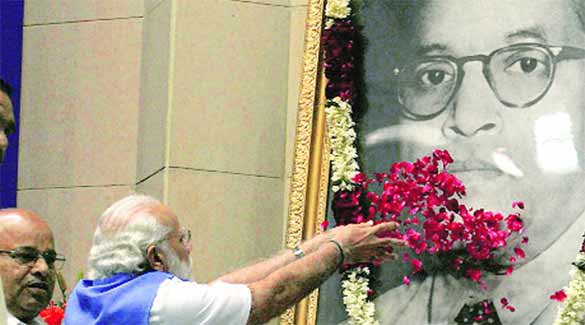This 14th April the 127th birth anniversary of Bhimrao Ambedkar was marked by heightened celebrations of the occasion by most political formations, but more so by BJP. Prime Minister Modi while paying tributes to Babasaheb said that the Congress was against Ambedkar, that his government has given him the honor due to him, and that no government has honored Babasaheb as much as the current regime!
In this game of appropriating Ambedkar, the BJP is operating on multiple grounds. One is the propaganda that the Congress was opposed to him; two is that it is the BJP which is honoring him by introducing an app like BHIM in his name or dining with dalits in their households. It is true that in posturing to honor Ambedkar, the BJP is dominating the scene, but are BJP’s policies really upholding what Babasaheb stood for? What does respect mean—mere posturing or valuing his political and social contributions?
The fact is that Ambedkar’s world view and philosophy stood totally against what BJP stands for. BJP can speak with a forked tongue with great amount of expertise. When it says that the Congress was opposed to Ambedkar, nothing can be farther from truth. We know that Ambedkar’s struggles for breaking the shackles of the caste system were a major influence on Mahatma Gandhi which led him to launch his anti-untouchability struggles, which was a real way to honour Ambedkar. Though he was not member of the Congress, Ambedkar was invited to become a member of Nehru’s Cabinet with the important portfolio of law. It was Congress which took his concerns seriously and he was made the Chairman of drafting committee of Constituent Assembly. Not only that, social reforms were uppermost in the minds of Nehru-Congress, because of which Nehru asked Ambedkar to draft the Hindu Code bill, which was opposed by BJP’s parent organisation to the core.
How do we assess the BJP attitude to Ambedkar? First, we need to recognise that though the BJP was formed only in 1980, its roots lie in its predecessor, the Bhartiya Jan Sangh (1952), and the parent organization of both is the RSS (1925), whose ideology of Hindu nationalism controls its politics. At all crucial occasions, the RSS opposed Ambedkar ideologically. With regard to the Indian Constitution, when the draft of the Constitution was presented to the Constituent Assembly, the RSS mouth piece Organiser (November 30, 1949) wrote: “There is no trace of ancient Bharatiya constitutional laws, institutions, nomenclature and phraseology in it . . . there is no mention of the unique constitutional developments in ancient Bharat. Manu’s laws were written long before Lycurgus of Sparta or Solon of Persia. To this day his laws as enunciated in the Manusmriti excite the admiration of the world and elicit spontaneous obedience and conformity among Hindus in India. But to our constitutional pundits that means nothing.”
The RSS took out its worst aggression against Ambedkar when he presented the Hindu Code bill. The RSS Chief M.S. Golwalkar came down scathingly on it. In a speech of August 1949, he said that the reforms piloted by Ambedkar “has nothing Bharatiya about it. The questions like those of marriage and divorce cannot be settled on the American or British model in this country. Marriage according to Hindu culture and law is a sanskar which cannot be changed even after death and not a ‘contract’ which can be broken any time.” Golwalkar continued: “Of course some lower castes in Hindu Society in some parts of the country recognise and practice divorce by custom. But their practice cannot be treated as an ideal to be followed by all.” (Organiser, September 6, 1949).
The BJP came to power in 1998 at the head of a coalition, the NDA. One of its important Cabinet ministers was Arun Shourie, who has written a most scathing criticism denouncing Ambedkar. Even while the current dispensation is garlanding his portraits and photographs, BJP minister Anantkrishna Hegde openly declares that the BJP has come to power to change the Constitution. While Ambedkar was deeply wedded to secularism and equality, the UP Chief Minister Adityanath Yogi declares that secularism is the biggest lie of independent India. The strategy of BJP is to pay lip service to Babasaheb and at the same time to erode his principles regarding caste and gender equality, his principles as made explicit through his burning of Manu Smriti, the book which RSS ideologues have been upholding.
Ambedkar was for annihilation of caste, as he saw this as the major obstacle to social justice. In contrast, RSS ideology talks of harmony between castes; this also gets manifested in RSS work among dalits through the Samajik Samrasta Manch.
At another level Lord Ram has been the central figure in their political mobilisation. Had BJP family really been respecting Ambedkar, would they have made Lord Ram the central symbol of their politics? The Ram temple issue has been used by BJP to strengthen itself. UP Chief Minister has announced a huge statue of the Lord in Ayodhya. Lately Ram Navami is being promoted all over the country, on the occasion of which armed youth take out processions particularly in Muslim localities. What had Ambedkar to say about Lord Ram? In his book Riddles of Hinduism, Ambedkar is critical of Lord Ram, pointing out that the Lord kills Shambuk, a low caste boy who is doing penance, and also kills King Bali from behind his back. Ambedkar’s reserves his strongest criticism of the Lord for banishing his pregnant wife Sita and not enquiring about his sons or wife for long years!
Respecting Ambedkar is not just garlanding him, respecting him has to begin with upholding his critique of Manusmiriti, respecting the values of Indian Constitution and dedicatedly working for secularism and social justice, which were his central concerns. BJP’s policies have strengthened anti-Dalit biases and violence, which has become more overt during the last few years. In contrast, Gandhi–Nehru–Congress valued Ambedkar’s concerns, despite having different political affiliations.

